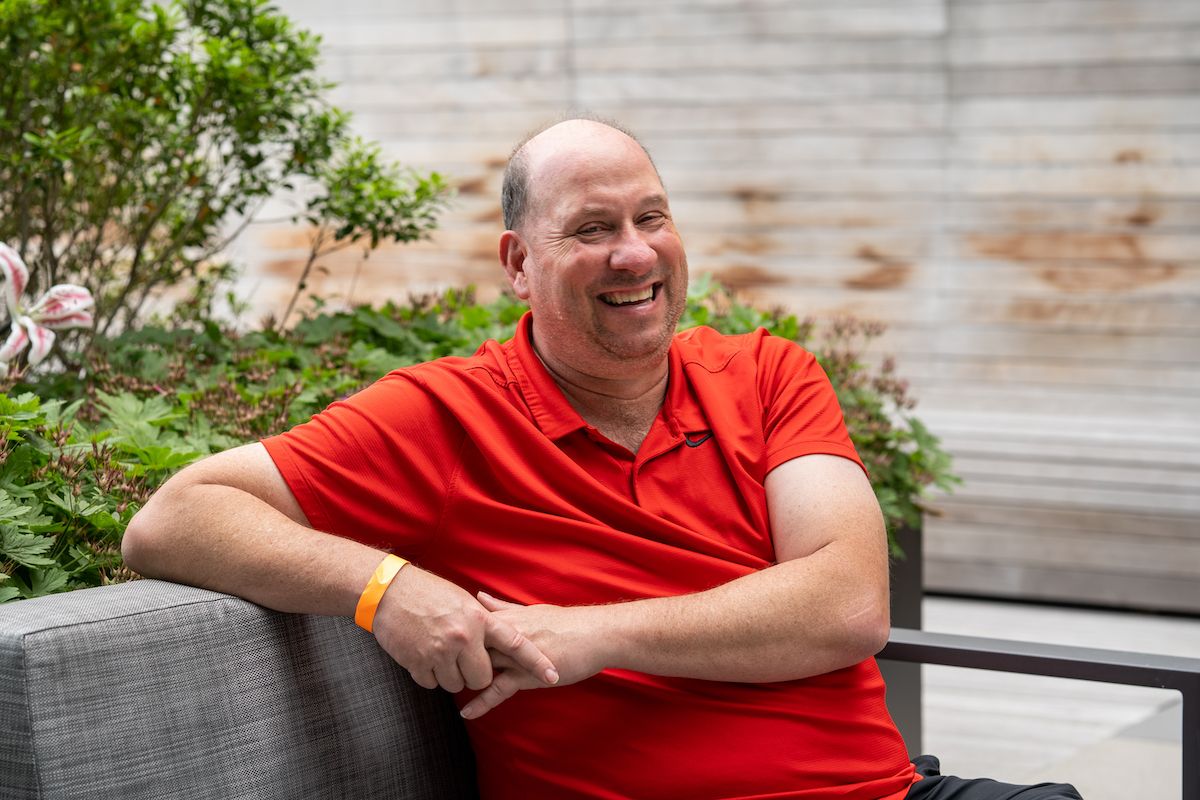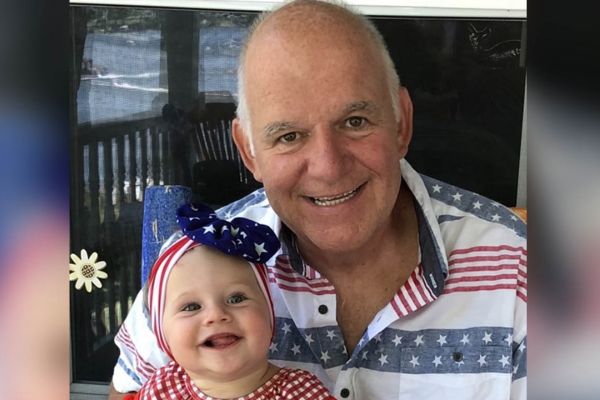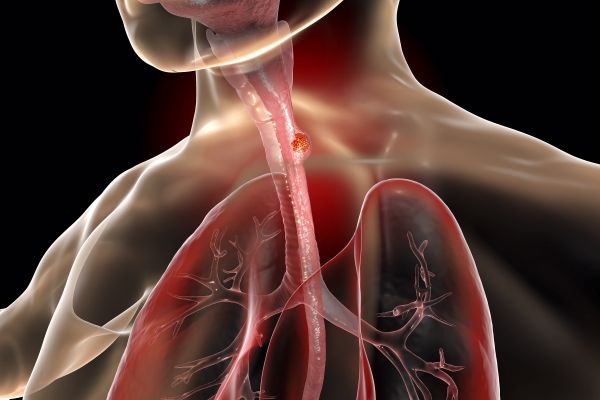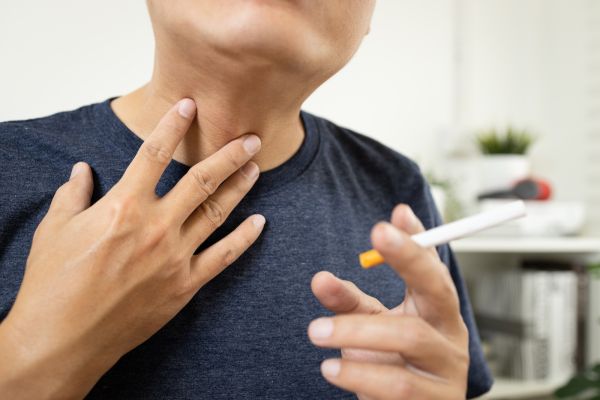A clinical trial provided a new treatment approach that made a difference
As a former All-American high school athlete, Division I college swimmer, a competitor in the 1988 U.S. Olympic Trials, ranked number one in the world in the 400-meter freestyle for part of 1989, and now a nationally recognized coach, Rick Aronberg, 54, knows a lot about qualifying trials.
But perhaps the most important trial Rick ever participated in was a clinical trial at Roswell Park Comprehensive Cancer Center that transformed him from a patient with stage 4 gastroesophageal junction cancer to a survivor whose tumor is entirely gone, with scans that show no evidence of disease.
In 2020, Rick was living his life, coaching competitive swimmers in Pennsylvania. “But I missed being home with my wife Laurie, who still lived in the Buffalo area and works as an administrative assistant in the Molecular Biology Department at Roswell Park,” Rick recalls. After securing a “dream job” overseeing the City Swim Project, with learn-to-swim and competitive swimming programs for underserved populations in Buffalo, Rick began packing up the moving van in April 2020.
“On my final day of moving, I pulled open the van door and all of sudden it felt like a muscle in my back was ripped to pieces. The pain went away after a few days, so I thought maybe I’d just pulled or strained something,” Rick says. The following month, while biking, Rick noticed a slight pain in his chest, and occasional shooting and stabbing pains in his back as he worked around the house. “I called my doctor and as soon as he heard the words ‘chest pain,’ he told me to go the emergency room and get my heart checked out. My heart was fine, but the pains continued, so I was then referred to a chiropractor. The adjustments mostly felt good, but they didn’t completely take away my pain.”
Soon, Rick experienced two more classic signs of esophageal cancer. “I was eating breakfast, and I had trouble swallowing my cereal. It felt like it got stuck in my throat. During my chiropractic adjustment, I couldn’t comfortably lie down on my stomach. When I told my doctor about these symptoms, he spoke with my chiropractor, and then told me to make an appointment as soon as possible at a local facility for an endoscopy.”
Three days later, Rick learned he had stage 4 gastroesophogeal junction cancer ( the area where the esophagus joins the stomach). “I was given a choice to see a doctor at another facility, but because of what I know about my wife’s work and the cutting- edge research and treatment at Roswell Park, of course I went to Roswell Park,” Rick says.
Opting for a clinical trial
Within days, Rick and Laurie met with Roswell Park’s Sarabjit Mukherjee, MD, MS, a gastrointestinal medical oncologist with a research focus on clinical trials and cancer immunotherapy. “It didn’t take long for me to know I was in the right place,” Rick recalls. “Like many people with esophageal cancer, because the symptoms are so vague, I already had advanced disease at the time of diagnosis. My cancer was identified as an aggressive HER2+ type – the same genetic change associated with aggressive types of breast cancer. Dr. Mukherjee clearly explained that I could be treated using the current standard of care which would involve two types of chemotherapy drugs.
"But then he gave me another choice. He told me he was in the final stage of enrolling patients in a promising multi-institutional clinical trial that combined standard chemotherapy for HER2+ esophageal tumors with an immunotherapy drug, and that I met all of the requirements: I’d never been treated for this type of cancer before, I had HER2+ cancer, and I had a healthy immune system. I noticed that Dr. Mukherjee was smiling when he told me this. For me, this was a no-brainer, and I jumped in with both feet,” Rick says.
Drawing on his athletic background, Rick describes Dr. Mukherjee as “my head coach, and everyone else I came in contact with were the trainers and assistant coaches. It was all so well coordinated. Everyone greeted us with a smile and treated us with respect, including the volunteers, the front desk staff, the phlebotomists, the team that quickly analyzed and input my blood test results, my caseworker, the pharmacists who prepared my drugs, the nurses who administered the drugs and the visiting nurses who monitored the fanny pack of drugs I wore at home for exactly 46 hours after my chemotherapy sessions at Roswell,” Rick says. “They were all true professionals and they are all my heroes.”
During his treatment, Rick had many other heroes as well. “So many of my swimming and coaching friends came to our aid, and my wife Laurie was a rock during all of this, taking care of both me and her mother during a major pandemic.”
Rick’s treatment had some drawbacks, of course. “I spent a full day at Roswell Park's infusion center every two weeks over the course of six months. I lost my sense of taste and didn’t want to eat. I ended up losing 30 pounds. But I never got sick and never lost my hair, so compared to many others, my treatment was relatively easy.”
Three months after starting the trial, Rick had a CT scan. "We were all elated when it showed that my tumor had shrunk by 51%.” Rick continued with his treatment, and three months later his tumor had shrunk by another 3%. At his last scan in April 2021, Rick’s tumor was completely gone. “I was the 17th person enrolled in this trial of 18, and by the end of the trial, tumors were markedly decreased in 61% of the cases, with mine being the first full no evidence of disease (NED) response,” Rick says.
Clinical trials
Find out more about what clinical trials are and how they are used to find new techniques to treat cancer.
New trials show even more promising results
In July 2021, Dr. Mukherjee and his colleagues published and presented the results of the study, and they continue to monitor the patients from this trial. Dr. Mukherjee and his colleagues have since used another treatment similar to the one that Rick had, replacing Avelumab (one of the immunotherapy drugs given to Rick) with pembrolizumab (Keytruda®), another type of immunotherapy drug.
“This next trial (Keynote-811) showed that when you combine pembrolizumab with chemotherapy and trastuzumab (Herceptin®), those patients did really well,” Dr. Mukherjee says. “Almost everybody had some sort of stability or disease control and a significant portion of patients had disease response. The overall response rate was 75%, but if you look at whether a patient had any decrease at all, 97% of the patients had some decrease. That is quite significant. This study will mature, and we will see what the data looks like, but this is practice changing.”
In the meantime, Rick continues on a monitoring and maintenance plan, with infusions of pembrolizumab at Roswell Park every six weeks, for another year. A self-described “easy going person who loves to laugh,” Rick continues to pursue his passion of coaching swimmers and reflects on his gratitude for being part of the process that may save the life of many other patients with advanced esophageal cancer.
“I now take great joy in little things that I used to hate, like mowing the lawn and working around the house. I’m thrilled to be able to taste and enjoy food again. I’m so happy to be back in Buffalo, and I am especially grateful that I chose to be treated at a comprehensive cancer center like Roswell Park, with the type of research and access to clinical trials that saved my life.”
Editor’s Note: Cancer patient outcomes and experiences may vary, even for those with the same type of cancer. An individual patient’s story should not be used as a prediction of how another patient will respond to treatment. Roswell Park is transparent about the survival rates of our patients as compared to national standards, and provides this information, when available, within the cancer type sections of this website.



